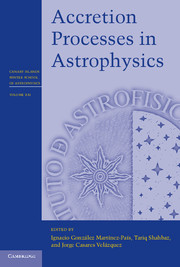Book contents
- Frontmatter
- Contents
- List of contributors
- List of participants
- Preface
- Acknowledgments
- Abbreviaions
- 1 Accretion disks
- 2 The evolution of binary systems
- 3 Accretion onto white dwarfs
- 4 Multiwavelength observations of accretion in low-mass X-ray binary systems
- 5 X-ray binary populations in galaxies
- 6 Observational characteristics of accretion onto black holes I
- 7 Observational characteristics of accretion onto black holes II: environment and feedback
- 8 Computing black-hole accretion
- A Piazzi Smyth, the Cape of Good Hope, Tenerife, and the siting of large telescopes
Preface
Published online by Cambridge University Press: 05 January 2014
- Frontmatter
- Contents
- List of contributors
- List of participants
- Preface
- Acknowledgments
- Abbreviaions
- 1 Accretion disks
- 2 The evolution of binary systems
- 3 Accretion onto white dwarfs
- 4 Multiwavelength observations of accretion in low-mass X-ray binary systems
- 5 X-ray binary populations in galaxies
- 6 Observational characteristics of accretion onto black holes I
- 7 Observational characteristics of accretion onto black holes II: environment and feedback
- 8 Computing black-hole accretion
- A Piazzi Smyth, the Cape of Good Hope, Tenerife, and the siting of large telescopes
Summary
It was more than 50 years ago when the first significant paper on accretion flows was written. Since then, the subject has grown incredibly, and today many X-ray satellites are engaged in research into observational signatures and tests of theoretical models for accretion processes in astrophysics. Recognizing the continued importance of this field, the Instituto de Astrofísica de Canarias organized the XXIst in its Winter School series around the topic “Accretion Processes in Astrophysics.”
The primary aim of the school was to provide a wide-ranging and up-to-date overview of the theoretical, experimental, and analytical tools necessary for carrying out front-line research in the study of accretion processes. The school was particularly designed to offer young researchers guidelines to support their research in these areas.
The 40 lectures presented a fairly comprehensive and up-to-date introduction to the major observational and theoretical topics associated with accretion. With emphasis on the physical processes involved, this includes applications to close binary systems such as cataclysmic variables and X-ray binaries and their evolution, as well as the theory of relativistic accretion flows and the accretion processes in active galactic nuclei. The lectures were given by eight experienced scientists who are actively working on a variety of leading research projects and who have played key roles in the advances made in the field in recent years.
- Type
- Chapter
- Information
- Accretion Processes in Astrophysics , pp. xiii - xivPublisher: Cambridge University PressPrint publication year: 2014



